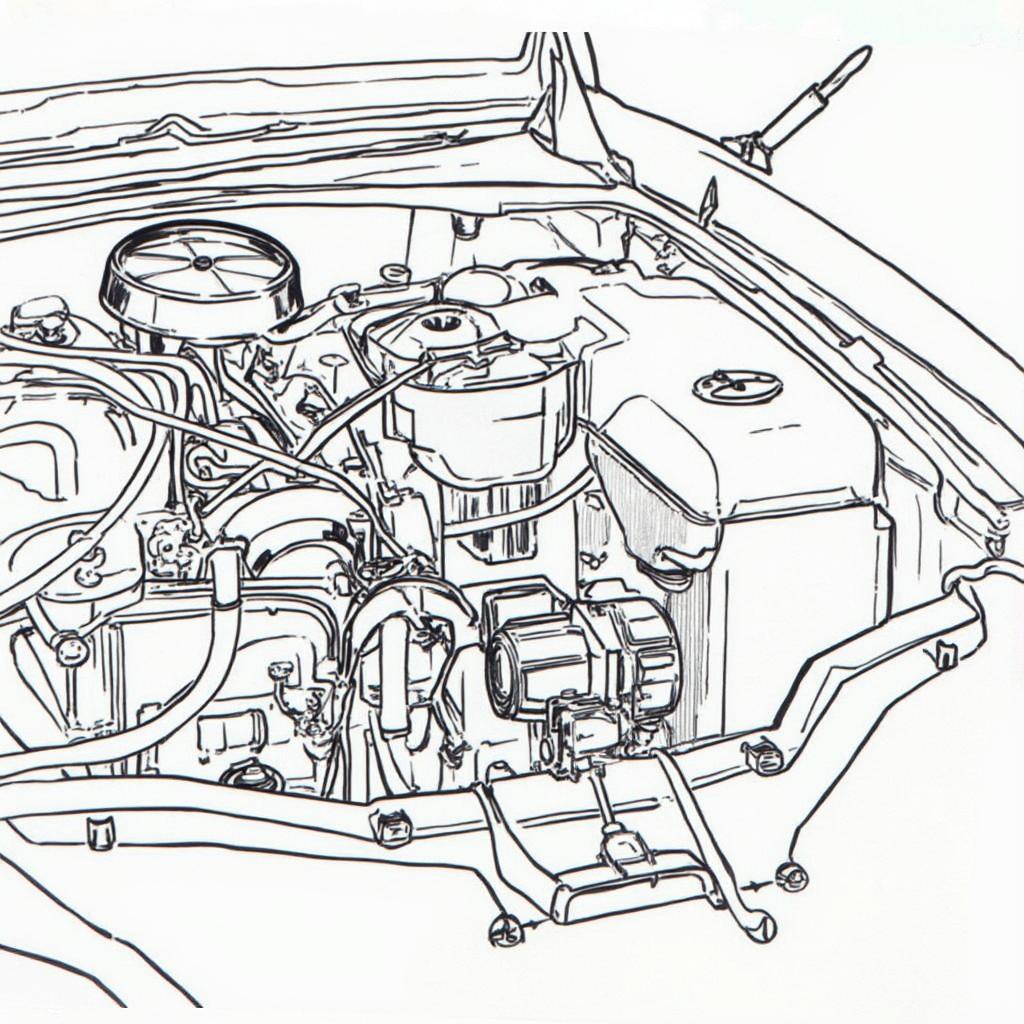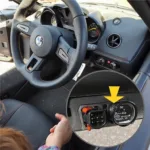The dreaded P0463 code. If you’re a Chevy owner seeing this on your OBD2 scanner, it means your fuel level sensor circuit is reporting a high input. This article will dive deep into the P0463 code, helping you understand what it is, its common causes, and how to fix it. We’ll explore everything from faulty wiring to a bad fuel pump, equipping you with the knowledge to tackle this issue head-on.
Understanding the Chevy OBD2 Code P0463
The P0463 code specifically points to a problem with the fuel level sensor circuit. This sensor, located in your fuel tank, measures the amount of fuel and sends a signal to the powertrain control module (PCM). A “high input” indicates the PCM is receiving a signal suggesting there’s more fuel than there actually is. This can lead to inaccurate fuel gauge readings, leaving you stranded with an unexpectedly empty tank.
What does a P0463 code mean on a Chevy? Simply put, it indicates an issue within the fuel level sensor circuitry, leading to incorrect fuel level readings.
Common Causes of the P0463 Code in Chevy Vehicles
Several issues can trigger the P0463 code. Here are the most common culprits:
- Faulty Fuel Level Sensor: The sensor itself can wear out or become damaged over time, leading to inaccurate readings.
- Wiring Problems: Damaged, corroded, or loose wiring in the fuel level sensor circuit can disrupt the signal.
- Fuel Pump Issues: While not directly related to the sensor, a failing fuel pump can sometimes cause pressure fluctuations that affect the sensor’s readings.
- Damaged Connector: The connector that attaches to the fuel level sensor can become corroded or damaged, interfering with the signal.
- PCM Problems: In rare cases, a faulty PCM can misinterpret the sensor’s signal, triggering the P0463 code.
How to Diagnose and Fix the P0463 Code
Diagnosing the P0463 code requires a systematic approach. Start by checking the wiring and connectors for any visible damage or corrosion. If you find any, repair or replace them as needed.
Next, test the fuel level sensor itself using a multimeter. This will help you determine if the sensor is functioning correctly. If the sensor is faulty, replacement is the only option.
If the wiring and sensor check out, inspect the fuel pump. A failing fuel pump can sometimes cause pressure fluctuations that affect the sensor’s readings.
Finally, if all else fails, the problem may lie with the PCM. However, this is a rare occurrence and should only be considered after exhausting all other possibilities.
Checking the Wiring and Connectors
Carefully inspect all wiring and connectors associated with the fuel level sensor. Look for any signs of damage, corrosion, or loose connections. Even a small break in the wiring can disrupt the signal and trigger the P0463 code.
Testing the Fuel Level Sensor
Using a multimeter, test the resistance of the fuel level sensor. Compare your readings with the manufacturer’s specifications to determine if the sensor is functioning correctly.
Inspecting the Fuel Pump
While not always the direct cause, a failing fuel pump can sometimes indirectly contribute to the P0463 code. Check the fuel pump for any signs of wear or damage.
Addressing PCM Issues
If all other checks reveal no issues, the problem may reside within the PCM. However, diagnosing and repairing PCM problems requires specialized equipment and expertise. It’s best to consult a qualified mechanic for this task.
What if the problem persists after replacing the fuel level sensor?
If you’ve already replaced the fuel level sensor and are still encountering the P0463 code, the issue may lie elsewhere. Double-check the wiring harness for any damage or loose connections, as well as the fuel pump and PCM.
“A common oversight is overlooking a simple loose connection. Always double-check your wiring,” advises John Smith, ASE Certified Master Technician.
Preventing Future P0463 Codes
Regular maintenance can help prevent future occurrences of the P0463 code. This includes inspecting the fuel system components for any signs of wear or damage and addressing any issues promptly.
Conclusion: Tackling the Chevy OBD2 Code P0463
The Chevy OBD2 code P0463 can be a frustrating issue, but with the right knowledge and approach, it’s manageable. By understanding the potential causes and following the diagnostic steps outlined in this article, you can effectively address this problem and get your Chevy back on the road. If you are still struggling with this code, consider consulting a qualified mechanic.
FAQ
- What does the P0463 code mean? It indicates a problem with the fuel level sensor circuit, specifically a high input signal.
- Can I drive my Chevy with a P0463 code? Yes, but you risk running out of fuel unexpectedly due to inaccurate fuel gauge readings.
- Is it expensive to fix the P0463 code? The cost depends on the underlying cause and can range from a simple wiring repair to a more expensive sensor or fuel pump replacement.
- How can I prevent the P0463 code? Regular maintenance and inspections of the fuel system can help prevent future occurrences.
- What tools do I need to diagnose the P0463 code? An OBD2 scanner and a multimeter are essential tools for diagnosing this code.
- What if the problem persists after replacing the sensor? Recheck wiring, fuel pump, and consult a mechanic if needed.
- Is the P0463 code specific to Chevy vehicles? While this article focuses on Chevy, the P0463 code can appear in other vehicle makes as well.
For further assistance regarding OBD2 codes and car diagnostics, explore our articles on 2011 chevy malibu fuel pump obd2 code.
“Addressing fuel system issues proactively can save you time, money, and potential headaches down the road,” says Maria Garcia, Automotive Engineer.
Need help? Contact us via WhatsApp: +1(641)206-8880, Email: [email protected] or visit us at 789 Elm Street, San Francisco, CA 94102, USA. Our customer service team is available 24/7.

